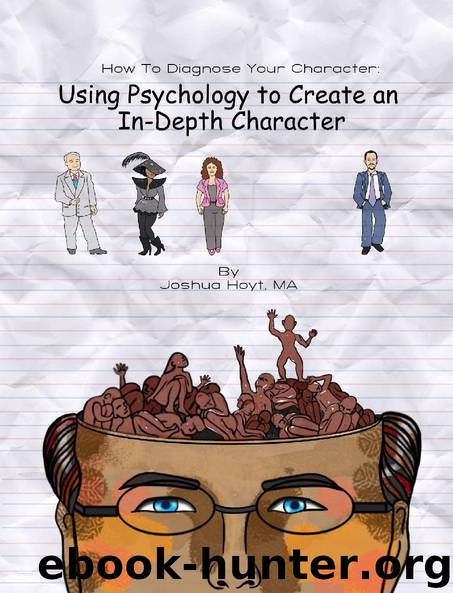How To Diagnose Your Character: Using Psychology To Create an In-Depth Character by Hoyt Joshua

Author:Hoyt, Joshua
Language: eng
Format: epub
Publisher: Unknown
Published: 2013-11-28T00:00:00+00:00
Chapter 7
Behavior and Perceptions
Behavior
Not only can we observe the physical characteristics of our characters, but we can also observe their behaviors. Ivan Pavlov created a situation in which he conditioned a certain response from dogs: salivation. When the dog heard the sound of footsteps or a bell, it would salivate. First, he used food, an unconditioned stimulus, to cause salivation, an unconditioned response. Second, a neutral stimulus (footsteps) was introduced with the unconditioned stimulus (food) and we got the unconditioned response (salivation). Step three repeats step two over and over. Finally, conditioned stimulus (footsteps) leads to the conditioned response (salivation).
Pavlov then applied this to human behavior to show that we have conditioned responses to certain stimuli. The following example shows how this happens. After my father got home from Vietnam he took a walk down the street and a car backfired, sending him to the ground. People around him didn’t dive to the ground because they didn’t have the same conditioned response (dive for cover) to conditioned stimuli (loud noise/gun fire). Looking at my father today, we can see how extinction works. My father no longer dives to the ground when he hears a loud bang. He might flinch, but not dive to the ground. A conditioned response (diving for cover) fades when the reinforcement (gun fire) disappears.
We need to understand the different unconditioned responses and unconditioned stimuli that affect our characters, as well as the neutral stimuli that may turn into conditioned stimuli. An example: a character as a young boy experienced the traumatic event of seeing his mother drown. That character now fears large bodies of water because they bring back memories of his mother drowning. Eventually the character will either no longer fear large bodies of water (extinction) or in the extreme, he may never recover from his fear, which we call Post Traumatic Stress Disorder (PTSD).
Protagonists generally have some superhuman ability. They find themselves in some pretty horrible situations and are able to recover. This makes me think of PTSD. Because PTSD happens to some people but not to all who experience the exact same event or circumstance. It raises some interesting questions: why do some people not get PTSD and how do we make it believable when our characters don’t get PTSD?
I will do this by sharing a personal experience. When I got into a car accident a couple of years ago, the fear of getting into another accident made me deathly afraid. I had run into the back of another person when they had stopped suddenly. My squishy brakes didn’t want to stop that day and so I didn’t stop in time. I felt like I had little control over the situation. This of course doesn’t mean that I had PTSD, only that my reaction had some similar characteristics that soon wore off. While discussing PTSD with my supervisor we both came up with one of the factors, probably the largest part, control. If a person feels like they have control over a situation, development of PTSD following the situation is less likely.
Download
This site does not store any files on its server. We only index and link to content provided by other sites. Please contact the content providers to delete copyright contents if any and email us, we'll remove relevant links or contents immediately.
Big Magic: Creative Living Beyond Fear by Elizabeth Gilbert(5754)
Paper Towns by Green John(5179)
On Writing A Memoir of the Craft by Stephen King(4935)
The Doodle Revolution by Sunni Brown(4753)
Hyperfocus by Chris Bailey(4112)
Evolve Your Brain by Joe Dispenza(3671)
Unlabel: Selling You Without Selling Out by Marc Ecko(3658)
The Red Files by Lee Winter(3411)
Draw Your Day by Samantha Dion Baker(3356)
The Power of Mindful Learning by Ellen J. Langer(3221)
The Art of Dramatic Writing: Its Basis in the Creative Interpretation of Human Motives by Egri Lajos(3058)
The War Of Art by Steven Pressfield(2955)
Applied Empathy by Michael Ventura(2892)
The 46 Rules of Genius: An Innovator's Guide to Creativity (Voices That Matter) by Marty Neumeier(2840)
How to be More Interesting by Edward De Bono(2789)
Keep Going by Austin Kleon(2755)
Why I Am Not a Feminist by Jessa Crispin(2748)
How to Stop Worrying and Start Living by Dale Carnegie(2714)
You Are Not So Smart by David McRaney(2645)
